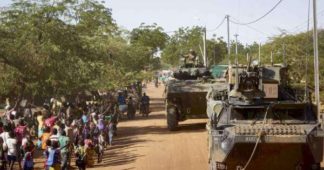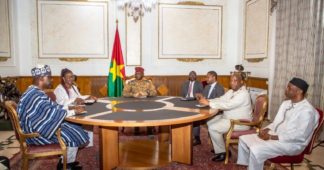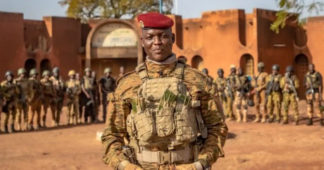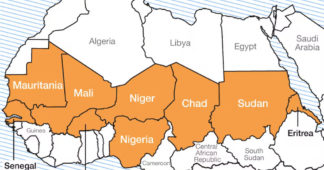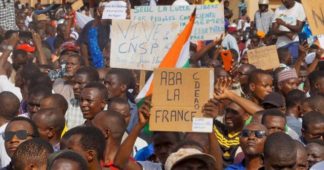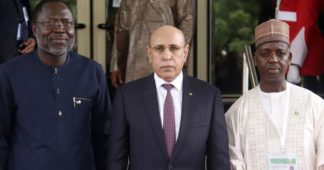By Abayomi Azikiwe*
Apr 30, 2025
Amid efforts aimed at nationalization and economic development, the United States Africa Command (AFRICOM) slanders a leading member of the Alliance of Sahel States (AES)
Another plot to destabilize Burkina Faso was reported last week over the national television network in the West African state.
Minister of Security Mahamadu Sana made the announcement to great dismay and outrage among the people inside the country.
Sana noted that the culprits involved in the plot were receiving support from French-aligned interests operating from Ivory Coast.
A number of military officers along with former government officials were named in the conspiracy to remove the current government under Capt. Ibrahim Traore.
Several people have been arrested in the aftermath of the coup attempt which was scheduled to take place on April 16.
Since the rise of Capt. Ibrahim Traore to power on September 30, 2022, the country embarked upon a process of reclaiming the natural resources and national sovereignty of its territory and residents.
Traore heads the Patriotic Movement for Safeguard and Restoration (PMSR) which was established in early 2022 under the former leader Lt.-Col. Paul-Henri Damiba. The PMSR was established after the removal of civilian President Roch Christian Kabore.
Kabore and Damiba were overthrown due to the failure of their administrations to curb the rebel insurgencies which under the guise of Islamism, have killed civilians, military personnel and created lawlessness across approximately 40 percent of the country. The failure of French and U.S. military soldiers and advisors, ostensibly in the Sahel region to enhance the security capacity of African states, have proved an abysmal failure.
Burkina Faso has united with neighboring landlocked states of Mali and Niger to sign the Liptako-Gourma Charter in late 2023. Later the Alliance of Sahel States (AES) was formed in 2024 breaking away from the western-oriented Economic Community of West African States (ECOWAS).
The AES has drawn the ire of France, the former colonial and neo-colonial power, along with the United States. In neighboring Niger, the French and U.S. forces have been forced to withdraw while a Pentagon drone station was dismantled at the aegis of the current ruling Committee for the Safeguard of the Homeland (CNSP). These events have upended the plans of two leading imperialist states to maintain their dominance in the resource-rich Sahel region of West Africa.
 In regard to the situation in Burkina Faso, the military leader of the U.S. Africa Command (AFRICOM) engaged in a verbal attack on Capt. Ibrahim Traore in a hearing before the Senate. General Michael Langley slandered Traore claiming that the resources from the sale of gold were being misused by the head-of-state.
In regard to the situation in Burkina Faso, the military leader of the U.S. Africa Command (AFRICOM) engaged in a verbal attack on Capt. Ibrahim Traore in a hearing before the Senate. General Michael Langley slandered Traore claiming that the resources from the sale of gold were being misused by the head-of-state.
These comments by Langley have been condemned throughout the African continent. In a report published by the Zimbabwe Mail, it says of the provocation:
“A firestorm of criticism has erupted across Africa following remarks by U.S. General Michael Langley, head of the United States Africa Command (AFRICOM), accusing Burkina Faso’s President, Captain Ibrahim Traoré, of misusing the country’s gold reserves for personal protection rather than national benefit. The comments were made during a recent U.S. Senate hearing, where General Langley alleged that Traoré had diverted vital national resources for his own security interests. The statement, swiftly picked up by African media and social platforms, has drawn sharp backlash from citizens, activists, and commentators across the continent. Many Africans took to X (formerly Twitter) to voice their outrage, accusing the U.S. of meddling in the sovereign affairs of African nations and displaying double standards in its foreign policy.”
These false allegations by Langley must be viewed within the context of the recent destabilization campaign against Burkina Faso and its revolutionary government. Historically, the U.S. has been hostile towards any anti-imperialist and socialist-oriented states on the African continent.
Nationalization of Gold Industry
 During 2024, the government of Burkina Faso revised its mining code creating a new state-owned firm called Société de Participation Minière du Burkina (SOPAMIB). Through this public entity, the PMSR administration has been nationalizing mines owned by foreign corporations.
During 2024, the government of Burkina Faso revised its mining code creating a new state-owned firm called Société de Participation Minière du Burkina (SOPAMIB). Through this public entity, the PMSR administration has been nationalizing mines owned by foreign corporations.
In a speech delivered over national television on April 28, Prime Minister Jean Emmanuel Ouedraogo announced that additional mines will be nationalized in the days ahead to generate more revenue for the government. These new policies have caused consternation among the mining firms which dominate the Burkina Faso extractive industries. See this.
Two mines were taken over by SOPAMIB last year and additional seizures are designed to provide the necessary monetary resources to modernize the country. This same pattern of nationalization is being replicated within other AES partners.
A report published by mining.com says of the current situation in Burkina Faso:
“Gold prices have risen by over 25% this year, fueled by geopolitical instability and U.S. President Donald Trump’s erratic trade policies. Burkina Faso, which has been fighting Islamist militants since 2015, produced over 57 tons in 2023. Mining companies operating there include Canada’s IAMGOLD and Australia’s West African Resources Ltd. The new mining code prioritizes national expertise and local suppliers, part of what the government calls a revolution in how its mineral wealth is managed. Burkina Faso’s relations with traditional Western allies have deteriorated since the military seized power in two coups in 2022, and it has pivoted toward Russia for security and economic cooperation. Last week, it granted an industrial mining license to Russian miner Nordgold for a gold project in the Kourweogo province of Burkina’s Plateau-Central region.
Ouédraogo said existing state-controlled mining initiatives have been successful, with the National Precious Substances Company collecting over eight tons of gold in 2024 and more than 11 tons in the first quarter of this year, primarily from artisanal sources.” (See this)
Prime Minister Ouedraogo said in his April 28 address that for the first time in its history the country has set up a gold reserve. These measures are already enhancing the economy, which has been crippled by the insurgent attacks and the hostility directed towards the PMSR administration.
AES-Algeria Dispute Over Downing of Surveillance Drone
On April 1, a Malian surveillance drone was downed by the neighboring Algerian military which accused the equipment of violating its airspace. Mali denied that the drone crossed over into Algerian territory.
The incident has created an unfortunate diplomatic row between Algiers and the AES saying that its neighboring country should be cooperating more closely with their efforts to crush the insurgencies. Relations between Mali and Algeria have fluctuated since the early 1960s when the National Liberation Front (FLN) was waging their independence war from France.
Mali under the newly independent government of President Modibo Keita played a critical role in providing a rear base for the FLN fighters. Algeria became independent from France in 1962.
In subsequent years, the presence of insurgents on the border between Mali and Algeria has resulted in tensions. The Tuarag people in the north of Mali have periodically engaged in violent efforts against the central government located in the southern capital of Bamako. Tuarags are spread out across several North and West African states as a result of the divisive character of the legacy of colonialism which broke up nations and city-states in the interests of imperialism. In recent years their Front for the Liberation of Azawad (FLA) has been involved in military clashes with the Malian government.
Other rebel groupings operating in northern Mali which are jihadist in their orientation has created a security crisis since early 2012. These developments are direct result of the Pentagon-NATO destruction of Libya in 2011 which was pivotal in the destabilization of various areas within North and West Africa
An article published by the Institute for Security Studies (ISS) says that the 55-member African Union (AU) must immediately work towards a diplomatic resolution of this recent incident:
“The AU must use the appropriate channels to rapidly re-establish dialogue and pave the way for a return to constructive relations between Algeria and the AES countries. Its Peace and Security Council should focus on the northern Mali issue, which is at the root of the dispute between Algiers and Bamako. Mali has accused Algeria in recent months of serving as a rear base for the separatist Front de Liberation de l’Azawad (FLA), after hostilities between the group and Bamako resumed when the government recaptured Kidal in November 2023.”
In other diplomatic events in the region, the Kingdom of Morocco has offered to allow the landlocked AES countries access to its ports on the Atlantic Ocean. Discussions took place on April 28 between Morocco and the foreign ministers of the AES countries.

This offer by Morocco has regional implications due to the strain relations between Rabat and Algiers over the status of the Western Sahara, which remains under the control of the Kingdom. Although since 1991 the United Nations has mandated that a referendum on Western Saharan independence be held, Morocco has not allowed this to happen. The issue remains a major source of disagreement within the AU with the Southern African Development Community (SADC) states being in firm alliance with the Polisario Front, the liberation movement seeking independence for the Sahrawi Arab Democratic Republic (SADR).
These disputes and conflicts illustrate the need to reinforce the diplomatic and military capacity of the AU. African problems require solutions which enhance the genuine independence and sovereignty of the continent and its people.
*Abayomi Azikiwe is the editor of the Pan-African News Wire. He is a regular contributor to Global Research.
We remind our readers that publication of articles on our site does not mean that we agree with what is written. Our policy is to publish anything which we consider of interest, so as to assist our readers in forming their opinions. Sometimes we even publish articles with which we totally disagree, since we believe it is important for our readers to be informed on as wide a spectrum of views as possible.
